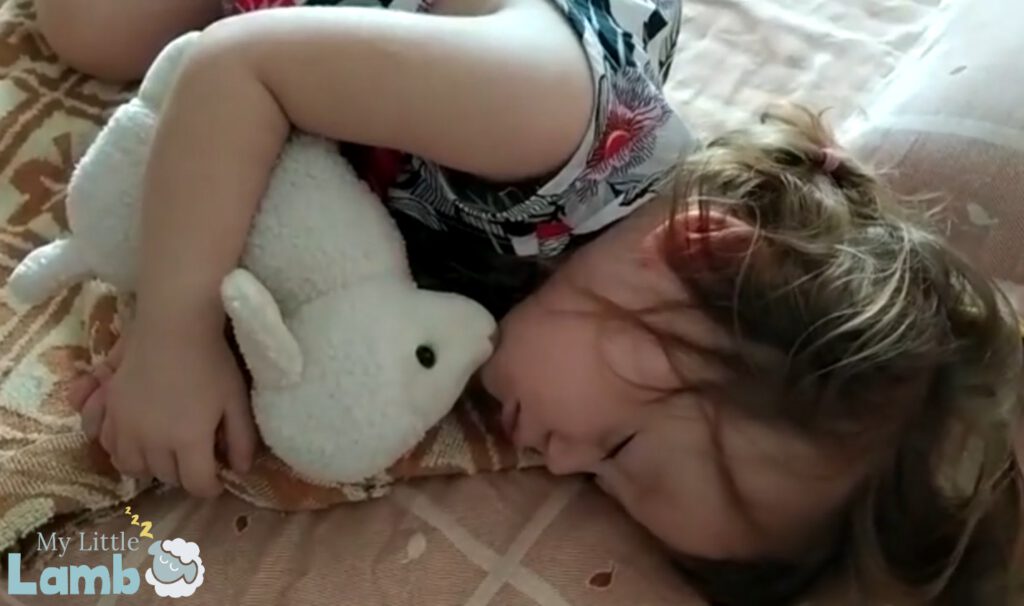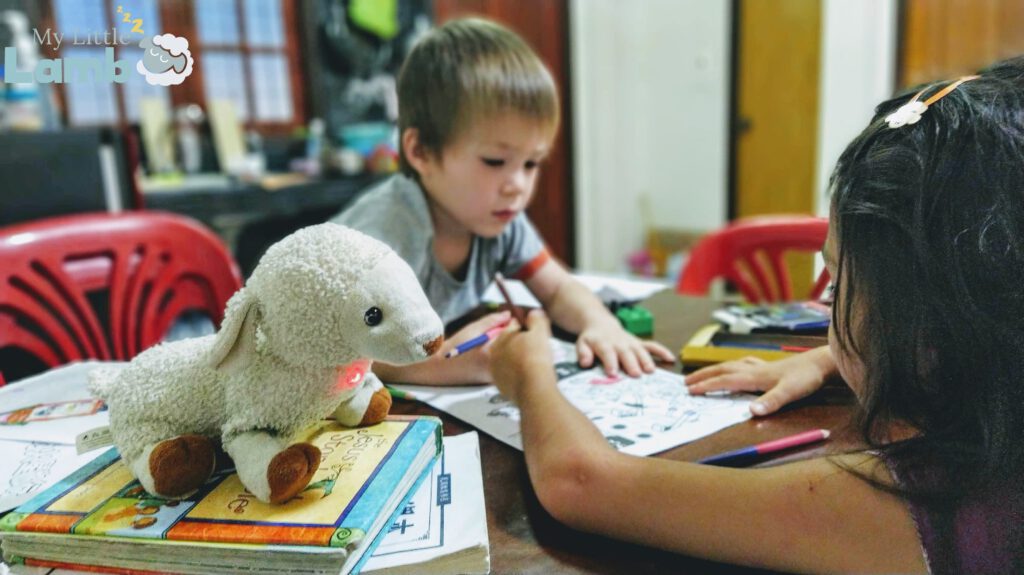
Having trouble falling asleep is one of the most common health problems for children. Sleep problems affect children at different ages. Some persistent sleep problems may require professional medical treatment. Others are linked to daytime behavior and bedtime habits that you can change to help your child sleep better at night. Common problems are related to stress, fear, and anxiety.
Children have vivid imaginations that lead them to overthink things and play scenarios in their minds that keep them up at night. There’s the fear of the dark and the scary thoughts of monsters lurking in the shadows that make your child not want to sleep alone. For other children going through some major changes such as moving to another place or going to a new school, they may feel insecure and worried. During these difficult times, we parents need to be supportive, patient, and understanding.
First, we need to understand that children of different ages require different hours of sleep to function at their best. Below is a sleep chart guideline that summarizes the recommended hours for each age group.
Recommended Hours of Sleep for Children
| Age Group | Recommended Sleep Time |
|---|---|
| Infants (1-12 months) | 12-16 hours (including naps) |
| Toddlers (1-2 years) | 11-14 hours (including naps) |
| Children (3-5 years) | 10-13 hours (including naps) |
| Children (6-12 years) | 9-12 hours |
| Teens (13-18 years) | 8-12 hours |
Next, establishing some healthy daytime and bedtime routines can greatly help children settle and feel safe, thus giving them a restful and restorative sleep. These are some daytime and bedtime habits that you can implement in your child’s daily routine to help him sleep better at night.
8 Daytime Habits to Promote Better Sleep at Night

- Consistent Daily Schedule: Keep the same wake-up schedule, even on the weekends. Allowing extra hours of sleep on weekends may backfire in the long run. But if wake-up time and bedtime are consistent, within an hour or so every day, this will make things easier for everyone.
- Get Plenty of Sunlight: Encourage your child to get as much sunlight as possible during the day, especially in the early morning. It is not only the best source of Vitamin D but also helps the body produce melatonin at night, which is beneficial for your child’s sleep cycle.
- Active Lifestyle: Regular exercise and active playtime will help your child spend lots of energy, making him rest better at night.
- Deal with Anxious Thoughts: If anxieties and fears affect your child’s sleep, try working on the problem together during the day. Allow your child to share and express his feelings with you, and let him write his anxious thoughts in a journal or draw about them.
- Right Amount of Food: Eat the right amount at the right time.Too much or too little food may keep your child awakeand uncomfortable.
- Bedroom Only for Sleeping: Use the bed only for sleeping, not playing, or using the tablet. If possible, make the bedroom a screen-free zone.
- Time-Out: Don’t use your child’s bedroom for a time-out. This will make your child associate his bedroom with punishment instead of relaxation.
- Napping: Make sure your child is not asleep for too long or too close to bedtime. Children typically need at least 4 hours between sleep periods before they feel sleepy again.
8 Bedtime Habits to Promote Better Sleep

A sleep-inducing environment is important as it sets the stage for bedtime. Establish a comforting, enjoyable, and relaxing bedtime routine that your child will look forward to every evening. Set the ideal bedtime atmosphere and mood, with a pre-bedtime routine of 20-45 minutes, including 3-4 soothing activities. Gradually wean your child from your presence. Teach your child to learn to soothe himself rather than relying on you. Hug and kiss to comfort but keep the contact brief instead of prolonged.
- Consistent Individualized Bedtime: Some children are early risers, and some are night owls. Set a regular bedtime and a wake-up time based on how many hours of sleep your child needs and stick to it as much as possible.
- Reduce the Focus on Sleep: Children have active minds and vivid imaginations that prevent them from shutting their brains off for the night. Instead of increasing their anxiety and stress by insisting that it’s time to close their eyes and sleep, try focusing more on relaxation and keeping your child calm.
- Sensory Tools – Soft sheets, room darkening shades,weighted blankets, stuffed animals, sound simulations, and relative quiet can help calm children and prepare them for bedtime. The darkened room makes it easier for them to differentiate between day and night. The blanket’s weight or cuddling with a favorite stuffed animal can make children feel safer and calmer.
- Light Exercise/ Deep Breathing Technique: Slow your child down with some soft and slow exercises, mostly to stretch the body and relax. This helps to slow the heart rate, calm the body, and relax the mind. Teach your child some deep breathing techniques. For example: Breathe in through your nose for 4 seconds, hold your breath for 7 seconds, and exhale through your mouth for 8 seconds.
- Calming Activities/ Family Time: A nice warm bath soothes your child and lowers the heart rate. The smell of lavender can ease anxiety. Besides essential life skills such as bathing and brushing teeth, other enjoyable activities such as singing songs/lullabies, reading storybooks, and praying together are activities that allow the brain to rest and promote better sleep. Cortisol, known as the “stress hormone,” also plays a role in sleep. When cortisol levels are high, the child’s body can’t calm down. Do these calming activities to reduce stress, making it easier for the child to fall asleep. Some children crave more attention from their parents, especially if both parents work during the day. Just asking them about their day, their interests, and their friends can go a long way in making them feel loved and appreciated.
- Comfortable Clothing and Cool Temperature: A child’s sleep cycle is also sensitive to temperature. Melatonin levels help to regulate the drop in internal body temperature needed to sleep. Regulate the external temperature by giving comfortable and breathable cotton pajamas and keeping the room temperature around 65 – 72°F(18.3 to 22.2°C) or a temperature that feels most comfortable for your child.
- Putting a Night Light in Their Room: Having a bed light helps to take away some fear of the dark and calm their frazzled nerves. Creating a safe and comfortable environment will give a more restful night.
- Positive Reinforcement/ Rewards: Giveincentives for good sleep behavior. For example: Getting a sticker first thing in the morning. Reward your child with a sticker for sleeping in his own bed.
5 Things to Avoid in the Evening
- Electronics: The blue light from the television, smartphone, or tablet disrupts the sleep/wake cycle and affects the production of melatonin, which regulates the sleep/wake cycle. If electronics are the only way for your child to settle, be sure to get anti-blue light glasses to reduce stress on the eyes. Avoid intense shows or scary cartoons that may cause nightmares.
- Caffeinated Drinks: Many sodas, teas, and energy drinks contain caffeine, which blocks sleep-inducing chemicals in the brain needed for bedtime. Limit your child’s consumption past lunchtime or cut down as much as possible.
- Vigorous Physical Activities: Avoid any intense games or high-energy sports that get your child too pumped up. The excitement and increase in body temperature can make it harder to go to sleep.
- Sugary Foods: Almost all kids enjoy their snacks, and some may want to have a treat before bedtime. However, sugary snacks will make children jumpy and fidgety. Chocolate contains caffeine, which makes it difficult for children to wind down.
- Drinking before bedtime: Avoid drinks at least 30 minutes before bedtime. Making frequent visits to the bathroom will keep children alert and active instead of making them settle. Try to encourage your child to use the bathroom one more time before going to bed.
We hope that these guidelines will help your child get better sleep. When children rest well, parents rest well too! If you’ve enjoyed this article, check out our next article: “50 Powerful Psalms to Help Children through Anxiety at Bedtime”




